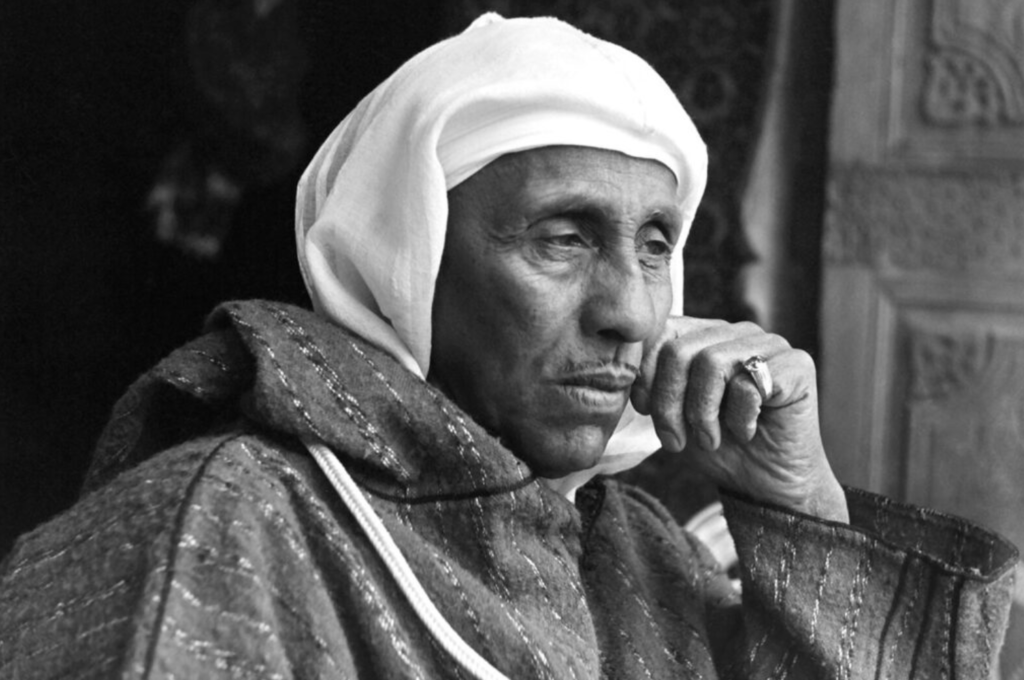The Pasha of Marrakech

By: Rania Basria / Arab America Contributing Writer
Pasha of Marrakech” refers to a municipal governor or ruler in Marrakech, Morocco’s political, cultural, and economic hub. The title “Pasha” was used throughout the Ottoman Empire and the Muslim world, particularly Morocco, to refer to a high-ranking official or governor. The Pasha wielded considerable power in Marrakech and its surroundings, especially under the Alaouite monarchy and the French Protectorate.
The Almoravid monarchy created Marrakech in 1070, and it swiftly became one of Morocco’s most prominent towns. It was the capital of the Almoravid and Almohad kingdoms and has had political and cultural importance throughout Moroccan history. By the nineteenth century, Marrakech had become a major center for trade, religion, and politics, attracting merchants, intellectuals, and politicians across North Africa and elsewhere.
The Moroccan Sultan bestowed the title of Pasha upon those who commanded large cities or areas. The Pasha of Marrakech was in charge of keeping order, collecting taxes, administering justice, and directing the city’s military fortifications. As the Sultan’s emissary, the Pasha had considerable political and administrative power and was frequently involved in complicated negotiations with local tribes, merchants, and religious leaders.
The El Glaoui family, a strong and important dynasty that dominated Moroccan politics in the nineteenth and twentieth centuries, produced the most well-known Pashas of Marrakech. The Glaoui family originated in the High Atlas Mountains and grew to prominence as a result of their allegiance to the Sultan, military capability, and ability to handle the region’s complicated tribal dynamics.
Thami El Glaoui, widely known as “The Lord of the Atlas,” is the most well-known Pasha in Marrakech. Thami El Glaoui was appointed Pasha in 1912 and served for nearly four decades, rising to become one of Morocco’s most influential rulers. His reign coincided with the French Protectorate (1912-1956), an era of major political transformation and modernization in Morocco. Thami El Glaoui’s tight collaboration with French authorities brought him tremendous power and fortune, but it also sparked controversy and protest.
Ambition, smart connections, and astute political maneuvering characterized Thami El Glaoui’s rise to the post of Pasha of Marrakech. Initially, Thami supported Sultan Moulay Abdelhafid, helping to quash rebellions and secure his power in Marrakech. However, he rapidly adjusted to the altered political situation after the French formed the Protectorate in 1912.
Thami El Glaoui joined forces with the French government after realizing the benefits of French colonial authority. He provided military assistance to General Hubert Lyautey, the first Resident-General of French Morocco, in exchange for extensive autonomy and authority over Marrakech and the surrounding areas. This alliance enabled Thami to consolidate control, acquire huge landholdings, and gain significant riches, cementing his position as one of Morocco’s most powerful leaders.
Thami El Glaoui, as Pasha, was a controversial character and respected leader. He controlled Marrakech with a blend of conventional authority, military power, and diplomatic skill. His government was distinguished by a focus on preserving order, providing security, and promoting economic development. He made significant investments in infrastructure, such as roads, schools, and public buildings, which helped modernize Marrakech.
However, his administration was plagued by political repression and contentious partnerships. Thami El Glaoui was noted for his opulent lifestyle, beautiful mansions, and tight relations with the French colonial officials, which gained him both adoration and anger. Many Moroccans viewed his collaboration with the French as a betrayal of national interests, and he became a focus of nationalist criticism.
Thami El Glaoui’s strong relationship with the French colonial authority was particularly contentious. While he hoped that his collaboration with the French would help him keep his power and position, many Moroccans considered him as a symbol of colonial tyranny and a traitor to the cause of freedom. He faced severe resistance from Morocco’s nationalist movement, which aimed to terminate French control and restore complete sovereignty to the country.
His involvement in the deposition of Sultan Mohammed V in 1953 increased his prominence. Thami El Glaoui backed the French decision to expatriate the popular Sultan and replace him with a more malleable monarch to strengthen his position. This conduct aroused considerable outcry and fueled opposition to the French and their Moroccan allies, especially El Glaoui.
By the mid-1950s, the tide had shifted against the French Protectorate and its supporters. Growing nationalist feelings, international pressure, and large protests resulted in Sultan Mohammed V’s return in 1955 and Morocco’s proclamation of independence in 1956. Thami El Glaoui, now in his late 70s, felt increasingly alone and frail.
Thami El Glaoui died in Marrakech in 1956, shortly after Morocco’s independence declaration. His death signaled the end of an era and the breakdown of the old order that governed Morocco during colonial rule. While his legacy is still debated, Thami El Glaoui is recognized as a complicated person who had a considerable impact on modern Morocco.
Thami El Glaoui died in Marrakech in 1956, shortly after Morocco’s independence declaration. His death signaled the end of an era and the breakdown of the old order that governed Morocco during colonial rule. While his legacy is still debated, Thami El Glaoui is recognized as a complicated person who had a considerable impact on modern Morocco.
The legacy of the Pasha of Marrakech, notably Thami El Glaoui, is complicated and multifaceted. On the one hand, El Glaoui is known for his contributions to the growth and modernization of Marrakech. His contributions in infrastructure, culture, and education helped to convert the city into a modern metropolis. On the other hand, his collaboration with the French and hostility to Moroccan independence have left a contentious and divisive legacy.
Thami El Glaoui’s tale highlights the intricacies of Moroccan history throughout the colonial period and the obstacles that local leaders encountered while navigating the tumultuous waters of colonialism, nationalism, and modernity. Today, Marrakech is one of Morocco’s most prominent and lively towns, with its history defined by people such as the Pasha.
The Pasha of Marrakech, specifically Thami El Glaoui, was an essential figure in Morocco’s history throughout the late nineteenth and early twentieth centuries. The Pasha, an influential leader and controversial personality, handled a complicated political terrain characterized by colonial control, opposition, and modernity. His legacy is still debated, reflecting the more significant issues of Morocco’s transition to independence and nationhood.
Visit our blog here!









